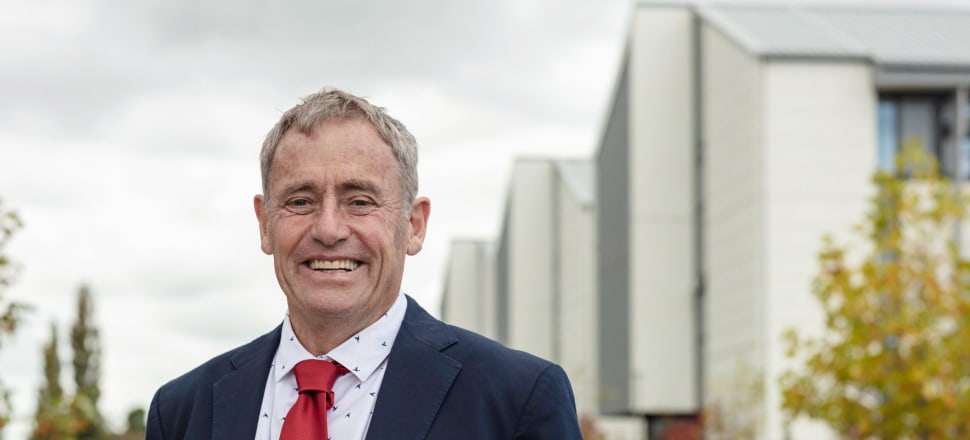
Vigilante councillor Phil Mauger beats his rival, former district health boss David Meates in Christchurch
Christchurch’s mayoral chains have passed to Phil Mauger, winning by 3771 votes over second-placed David Meates, the former district health board boss.
Mauger gained a total of 50,086 votes to Meates' 46,315 in a stacked field of 11 candidates, several of whom were no doubt standing to improve their chances of winning a council seat. Coming in at third place was Mark Chirnside with 4164 votes.
Three-term mayor Lianne Dalziel, the former Labour MP, stepped down at the election, paving the way for Mauger, a first-term councillor and former businessman whose family companies are involved in property development and contracting.
Mauger said he was "humbled" to be Christchurch's new mayor.
"I am very pleased that my message of regaining people’s trust in council and getting things done has resonated with so many people.
“I have consistently said during the campaign that I do not believe there is any place for party politics around the council table. I promise to be a mayor who listens to all ideas and works with people to get the best outcomes for our city.’’
He acknowledged Meates, saying "someone of David’s calibre run shows the commitment we have in Christchurch to local democracy".
Known as a vigilante councillor, after being fined for digging an unauthorised trench to stop flooding in an eastern suburb, Mauger’s pitch to voters was about common sense and getting things done.
He also announced his intentions early, giving him the jump on Meates, who only announced he was running in June.
Meates congratulated Mauger on Twitter and wished him well.
"Unfortunately, we didn’t get there - but it’s been great to work with an awesome team of supporters: it’s been important for the city to have a choice of candidates. I wish Phil all the best for bringing the city to its full potential."
The mayoral frontrunners agreed the city shouldn’t sell assets to pay debt, and the council needed to regain the public’s trust, after a dismal residents’ survey. Mauger zeroed in on dissatisfaction with the state of the city’s roads and footpaths, while Meates wanted to pilot participatory budgeting, in which local communities decide their spending priorities.
In May, Mauger was sent a warning letter by chief executive Dawn Baxendale for directly contacting staff at council-owned compost facility Living Earth. Last year, he texted Dalziel about his son, Jordan’s, plans to build a film studio on family-owned land – something the outgoing mayor thought was a conflict of interest.
Another controversy involving Mauger was a dinner invitation to Baxendale, to meet a trio of councillors, to discuss “mutual expectations” should they control the council, post-election.
A feature of the race was Mauger endorsing council candidates in almost every council seat. Four of them were successful: Cashmere Tim Scandrett, Fendalton James Gough, Harewood Aaron Keown and Waimairi Sam MacDonald.
Political pressure was heaped on three councillors – Melanie Coker (Spreydon), Sara Templeton (Heathcote) and Celeste Donovan (Coastal) – who voted against the council funding another $150 million to fund the $683 million stadium, Te Kaha.
They kept their jobs.
Conspiracy theorists Derek Tait, of Destiny Church, (Hornby ward), and Carl Bromley (Innes) did not get elected.
In Wellington, voters bucked the national centre-right trend by electing Green Party-endorsed Tory Whanau as mayor. She won out in a heated three-way race against incumbent right-leaning mayor Andy Foster and Labour MP Paul Eagle.
“It’s a dream come true,” Whanau told Newsroom on Saturday. “I feel hope for the city, because people have chosen to elect someone who wants progressive policies, they want to be able to connect to the mayor, they want them to be accessible.”

Preliminary results show Eagle, long considered the frontrunner, actually came in fourth behind independent councillor Ray Chung.
Whanau will have a crucial vote on a council split closely between independents and party-affiliated councillors. Five Labour candidates won seats as did two Greens, while independents took the other eight seats.
Further south, Jules Radich, the pro-business councillor leading the ‘Team Dunedin’ ticket, has snatched the mayoral chains from incumbent Aaron Hawkins to become the southern city’s 59th mayor.
It was a fractious term for the council, which plans a decade of high rates rises, and increasing debt, to pay for a $1.5 billion infrastructure bill to 2031.
Some mayoral candidates said the public felt they weren’t being listened to on key projects, like a potential change to the state highway one-way system through the central city, and the redevelopment of George St.
Radich’s allies on the Team Dunedin ticket – sitting councillor Andrew Whiley, and fresh faces, Kevin Gilbert,, and Brent Weatherall – were also elected.
Hawkins wished Radich “all the very best”, noting it just “wasn’t meant to be”.
Another incumbent has been unseated after Tim Shadbolt, New Zealand’s longest-serving mayor, was beaten by Nobby Clark in Invercargill.
With 6537 votes, Clark fought off nine other contenders, including broadcaster Marcus Lush. Lush gained 3785 votes, just ahead of Toni BIddle in third place with 3707.
There was no consolation for Shadbolt given he wasn’t elected as a city councillor either.
In Nelson, former National MP Nick Smith has been elected the city's new mayor after collecting nearly twice as many votes as his nearest rival Matt Lawrey.
Rohan O'Neill-Stevens came in third but will remain a councillor.
Smith retired from Parliament in 2021 citing personal and professional reasons.
Based on an initial progress result, sitting councillor Glyn Lewers has won the Queenstown-Lakes mayoralty. Lewers received 3678 votes ahead of challengers Jon Mitchell, with 3105 votes, and Olivia Wensley on 2110.
The voter return was 37.25 percent, being 10,464 votes.
Two-term incumbent Jim Boult decided not to seek re-election. The district is trying to attract new workers in a place that, for years, the lowest paid have struggled to meet the high cost of living.






